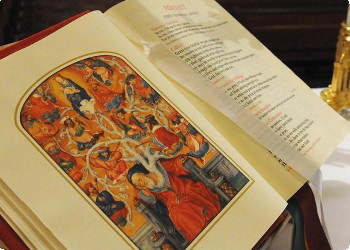HENCE, SHE HAS SHOWN GREAT LOVE
1 Cor 15,1-11; Ps 117; Lk 7,36-50
20 SEPTEMBER
A woman lives in sin. One day the grace of God enters with power in her heart. It makes her feel the miserable state of her life. The Holy Spirit creates in her the will of true spiritual resurrection. However, this is not enough for getting up from sin and death. It is necessary that the action of the “invisible God” meets with the action of the “visible God”. We know that the “invisible God” always acts with his powerful grace. But, the “visible God”, that welcomes those who are touched by grace and light and seals with his powerful action forgiveness and reconciliation is often missing. The “visible God” in the Gospel is Christ the Lord. “Visible Christ” in history is every one of his disciples. It is the ministry of the Christian – each according to the sacrament received and the spiritual gifts granted to him by the Holy Spirit – to welcome those who “the invisible God” touches with his grace. If the Christian does not become, does not let himself be made by the Holy Spirit “true visible Christ”, the external seal is not given, grace is not conferred, the Holy Spirit is not offered in the fullness of his divine essence and the path of salvation is not accomplished.
The Pharisee that welcomes Christ Jesus in his house is not the “visible God” and not even is he “visible holiness of the Lord”. This is attested by his judgment on Jesus: “If this were a prophet, he would know who is and of what kind is the woman that touches him: she is a sinner!” Simon is not a man with a pure heart. If he were, he would see the grace of God moving the woman towards Jesus and would see the mercy of the Father that is fully manifesting for Christ on the woman. In his home, at this moment, is taking place the meeting of salvation between the “invisible God” and the “visible God”. Not only is Simon not the “visible God” that welcomes the “invisible God”, he is the destroyer of this meeting. The denigrator. The ruthless judge that comes to deny the truth of essence and mission of Christ Jesus. This judgment attests to the falsity of his holiness and the darkness of his science. A holiness that does not see God acting in history certainly is not a holiness according to God. Instead we find ourselves faced with a satanic holiness and a diabolical science.
A Pharisee invited him to dine with him, and he entered the Pharisee’s house and reclined at table. Now there was a sinful woman in the city who learned that he was at table in the house of the Pharisee. Bringing an alabaster flask of ointment, she stood behind him at his feet weeping and began to bathe his feet with her tears. Then she wiped them with her hair, kissed them, and anointed them with the ointment. When the Pharisee who had invited him saw this he said to himself, “If this man were a prophet, he would know who and what sort of woman this is who is touching him, that she is a sinner.” Jesus said to him in reply, “Simon, I have something to say to you.” “Tell me, teacher,” he said. “Two people were in debt to a certain creditor; one owed five hundred days’ wages and the other owed fifty. Since they were unable to repay the debt, he forgave it for both. Which of them will love him more?” Simon said in reply, “The one, I suppose, whose larger debt was forgiven.” He said to him, “You have judged rightly.” Then he turned to the woman and said to Simon, “Do you see this woman? When I entered your house, you did not give me water for my feet, but she has bathed them with her tears and wiped them with her hair. You did not give me a kiss, but she has not ceased kissing my feet since the time I entered. You did not anoint my head with oil, but she anointed my feet with ointment. So I tell you, her many sins have been forgiven; hence, she has shown great love. But the one to whom little is forgiven, loves little.” He said to her, “Your sins are forgiven.” The others at table said to themselves, “Who is this who even forgives sins?” But he said to the woman, “Your faith has saved you; go in peace.”
Today the religious crisis of the contemporary world lies entirely in not being a Christian the “visible Christ” in the midst of his brothers. The “invisible Christ” wants to aggregate to his body, calls to conversion and salvation and illuminates with his light. Ananias not only refuses to accept, he does not even exist anymore. Who can the Lord turn to? To nobody. The Christian, with sophisticated, satanic reasoning, instead of declaring his non-existence as “the invisible Christ”, accuses the world of not wanting the Gospel.
Immaculate Virgin, Angels and Saints ensure that the Christian awakens from his sleep of death.





